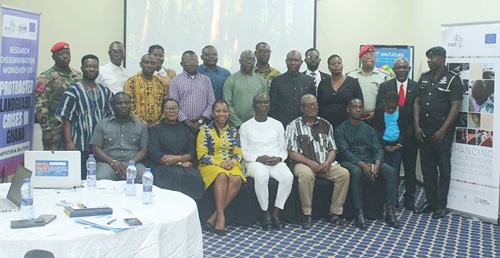Land disputes have been identified as one of the biggest national security threats to the country, leading to an annual internal displacement of more than 2,000 people.
The recent land conflict at Gbiniyiri in the Savannah Region, which claimed 34 lives and led to the displacement of more than 48,000 people, has reinforced the seriousness of the issue to national security and cohesion.
The rise in land disputes, coupled with land guard activities, has led to a spike in harassment and violence related to land transactions, with more than 40 cases being reported weekly to the Property Fraud Unit of the Ghana Police Service.
Despite the enactment of the Vigilantism and Related Offences Act, 2019 (Act 999) and the Land Act, 2020 (Act 1036), which have outlawed and criminalised land guardism in all forms, the menace is on the rise, putting at risk the nation’s security and its development.
These findings came up during a research workshop conducted on land guard activities in the country.
Known as the Protracted Land Guard Crises in Ghana: Adaptation and Solutions, the research conducted by Enact Africa in collaboration with the Foundation for Security Development in Africa (FOSDA), with funding from the EU, delved into the factors causing land guardism, its impact, as well as ways of reducing the menace.
Root causes
At the workshop, a Professor of Law at the University of Ghana School of Law, Prof. Kwame Gyan, said there was a need for the country to comprehensively deal with land guardism by resolving the root causes of the issue.
He identified a lack of opportunities for the youth and other sections of society as part of the reasons fuelling land guard activities in the country.
According to him, the land guard phenomenon is a threat to national security, which has become complex to resolve because there is ample demand and supply for land guard services.
Weak institutions
Prof. Gyan, who is a renowned land expert and the main architect behind most of the laws regarding land administration, said that although the law had been strengthened to criminalise not only the activities of land guards, but also those who procured their services, the use of land guards was still on the increase.
He attributed the phenomenon to a lack of trust in state institutions such as the Lands Commission and the law courts in resolving land disputes.
Lack of trust
The Head of Approval at the Land Registration Division of the Lands Commission, Sebastian Kwara, acknowledged that there was a lack of public trust in his outfit.
To change this perception, he said the commission had implemented many initiatives to improve transparency and accountability in its operations, and these included displaying the fees charged by the commission.
Serious crisis
The Executive Director of FOSDA, Theodora W. Anti, described land guardism as a protracted issue that has negatively affected the peace, security and livelihoods of many people.
“According to the 2025 Global Peace Index, Ghana now ranks 61st out of 163 countries globally, and 7th in Sub-Saharan Africa, a sharp decline from previous years.
This downward trend reflects growing domestic tensions, including those driven by land-related violence,” she said.
A representative from the National Peace Council, Frank Wilson Bogya, described land disputes and chieftaincy crises as the greatest threat to peace in the country.
He revealed that chieftaincy and land disputes accounted for almost 50 per cent of the cases handled by the National Peace Council, which showed the seriousness of the issue.
Writer’s email: emma.hawkson@graphic.com.gh

